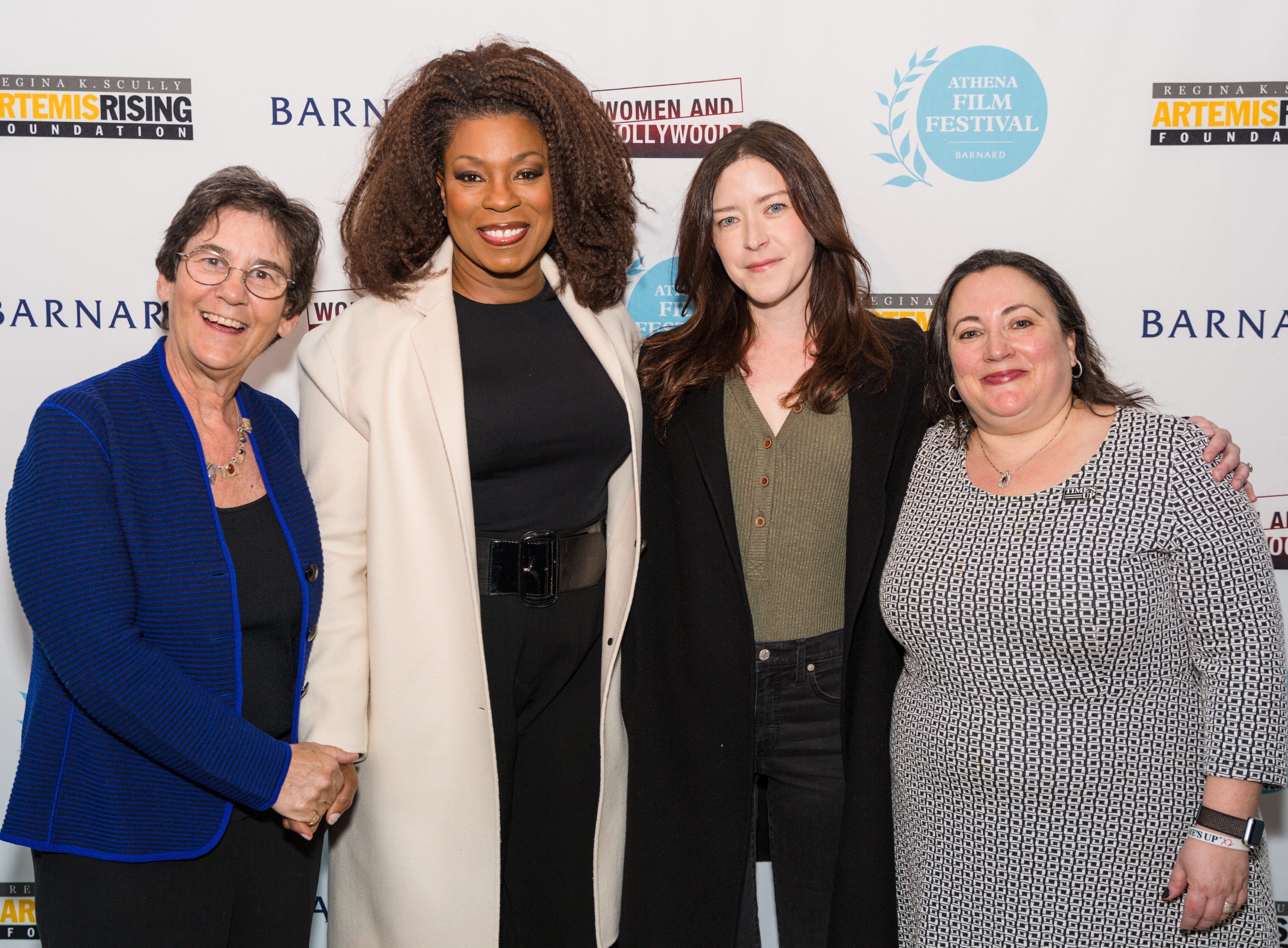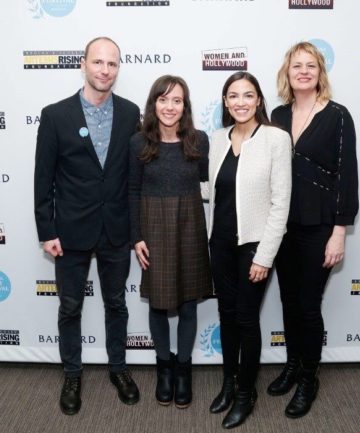Women leaders take center stage at Athena Film Festival

- In the days of treacherous back-alley abortions, seven outrageously daring women, risking charges of conspiracy to commit murder, make safe abortions available to 11,000 women as the Jane Collective.
- Fearless foreign correspondent Marie Colvin gives voice to the voiceless, victims of battles in the most dangerous places on earth, finally surrendering her own body to the rubble of war.
- Three generations of black women, including two mothers, wrestle to manage their superpowers — abilities rendered in shimmering, iridescent colors, which enable them to create and re-create rather than destroy the world to save it (the purview of male superheroes).
- Four working-class grassroots women who have never before run for office enter the primary fray of the U.S. 2018 mid-term elections, including a winner—NYC Congresswoman, the irrepressible Alexandria Ocasio-Cortez.
Those were just some of the women leaders (real and imaginary) spotlighted at the ninth annual Athena Film Festival at Barnard College in New York (Feb. 28–March 3). While there are other festivals devoted to showing films by and about women, Athena has a larger and singular mission: to center women, to showcase stories about women leaders in the world and ordinary women who rise to meet the challenges in their own individual lives.
Of the films mentioned above, the first three — Ask for Jane, A Private War, and Fast Color — were among the 17 feature films screened at the festival; Ask for Jane and A Private War are fictional representations of real-life events. Features (as opposed to documentaries) remain the toughest nut for women filmmakers to crack. From 2007 to 2017, of the 1,100 top fictional feature films, 96 percent of all directors were male and a paltry 4 percent were female. Most were white, four were black, three Asian, and one was Latina. At the Oscars in 2019, not a single woman director of a feature film was nominated, and none of the eight best picture feature film nominees was directed by a woman.
Still, notes Athena’s co-director and Women and Hollywood founder Melissa Silverstein: “We are seeing more women getting the ability to direct these kinds of movies.” She points to several high-profile films screened at the festival: Marielle Heller’s Can You Ever Forgive Me?, the real-life story of literary forger and anti-hero Lee Israel; Josie Rourke’s Mary Queen of Scots; and Mimi Leder’s On the Basis of Sex, the exhilarating story of the early life of Ruth Bader Ginsburg, selected in 2014 for the Athena list, one of the festival’s premiere pipeline projects for promising screenplays featuring female leaders.
Other of the festival’s feature films were smaller but told no less powerful stories. Rafiki, directed by Wanuri Khiu, recounts the challenges to two young women who dare to fall in love in Kenya, where homosexuality is outlawed and the film was originally banned. Khiu sued the film board, resulting in the Kenyan Supreme Court’s temporarily lifting the ban, enabling the film to be considered for an Oscar and thousands of Kenyans to see it. Janice Cooke’s I Am Somebody’s Child: The Regina Louise Story follows the harrowing journey of the real African-American foster child who became trapped by the cruel policies of the child welfare and psychiatric care systems. And there was Jinn, Nijla Mu’min’s debut film, which tells the quirky, moving story of a black teenage girl, a hip-hop dancer, whose mother, a popular TV meteorologist, suddenly converts to Islam.
Not all of the Athena features were directed by women, though most were. For example, A Private War is Matthew Heinemam’s first feature. “One of the things that has always been clear,” says Silverstein, “is that if we really want to show the scope of women’s leadership, we need to make sure to include male-directed films. It’s about how men show women’s leadership, how they stand up for it and talk about it.” She adds that this is part of “the conversations that are happening all throughout the industry,” the conversation about “who tells the story.”
That subject — arguably related to the much larger conversation about cultural appropriation — came up in relation to Julia Hart’s feature Fast Color, about the three generations of black women with superpowers.
“Julia’s a white girl in Hollywood, and the normal, typical thing would have been to hire three white actresses, and the movie would have worked because it’s a beautiful script,” said Lorraine Toussaint, the African-American actress who played the family matriarch, in the Q&A that followed the film. Of Hart’s hiring black women instead, Toussaint asked: “Why would she choose to do that?”
What set her casting path, Hart explained, was that when she and her co-writer husband, Jordan Horowitz, saw the film Beyond the Lights, they were blown away by the actress Gugu Mbatha-Raw’s performance, her transformation. “That’s the character we’re writing,” they said to each other. They soon invited Mbatha-Raw to play the role and to their great joy, she said yes.
Of Hart’s decision, Toussaint observed: “You weren’t telling a black story. You were just telling your story, and you chose the best actor for it. The best actor happened to be black. The logic of casting that actor [was that] her family then becomes an interesting family of color. …[During the filmmaking] not once did we talk about being black. I wasn’t acting black; I wasn’t thinking about being black. That’s actually more revolutionary than you even realize.”

Hart acknowledged that for her, being a white woman telling a story about black characters was “taking a step outside of your comfort zone.” She’s absolutely clear that “people of color should tell stories about people of color. First and foremost, we need a lot more of that.” But, she added: “What those of us who are not of color have the responsibility to do is to have imagination about our characters that is bigger than ourselves.”
A number of the 15 full-length docs screened at this year’s festival captured the current zeitgeist as it pertains to women and power, none more successfully than Rachel Lears’ Knock Down the House. Recipient of the 2019 Festival Favorite Award at Sundance, the film sold out within a week of being announced at Athena — a first. At the screening venue, with AOC in the audience, the excitement was palpable — on the pass-holders line, the rush line of non-ticket holders without a chance of getting in (including me — no special dispensation for press), and in the theater, where some 400 people piled in for the show.
In the Q and A that followed, Silverstein asked the panelists for their advice to the young women in the room who want to be filmmakers or who want to be leaders.
“It’s about believing that you deserve to have power,” Lears said, “and that applies on a personal level. … Power can mean … having the strength to go about your everyday life and face the everyday challenges. … Or it can mean … taking huge risks to try to win a Congressional seat or … going into personal debt to make a creative project that no one else believes in but you really do. You have to tell yourself every single day that you deserve to do what you’re doing.”
As to her advice for young women, AOC said: “Do your take-up-your-space exercises, but also assert yourself. We have this crazy, anxious, internal monologue sometimes, what if, what if, what if…. What you need to do is just brush that aside, learn to push that out… and just say, be brave, be brave, be brave…because all those terrible things you’re saying to yourself, someone may tell you those things, but there’s something really freeing about accepting that.” Her bottom line message was this: “When you choose to be brave, then you’re brave.”
Where you can see:
Knock Down the House: coming to Netflix
Fast Color: April 19 theatrical release
A Private War: Amazon (pay)
Mary Queen of Scots, Can You Ever Forgive Me?, On the Basis of Sex (3/26): Amazon Prime
More articles by Category: Arts and culture, Media
More articles by Tag: Film, Activism and advocacy, Women's leadership



























